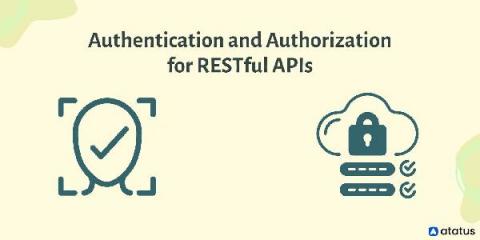Operations | Monitoring | ITSM | DevOps | Cloud
Technology
The latest News and Information on APIs, Mobile, AI, Machine Learning, IoT, Open Source and more!
Interview with AI Specialist Dhonam Pemba
For our latest expert interview on our blog, we’ve welcomed Dhonam Pemba to share his thoughts on the topic of artificial intelligence (AI) and his journey behind founding KidX AI. Dhonam is a neural engineer by PhD, a former rocket scientist and a serial AI entrepreneur with one exit. He was CTO of the exited company, Kadho which was acquired by Roybi for its Voice AI technology. At Kadho Sports he was their Chief Scientist which had clients in MLB, USA Volleyball, NFL, NHL, NBA, and NCAA.
Authentication and Authorization for RESTful APIs: Steps to Getting Started
Why do APIs require authentication in the first place? Users don't always need keys for read-only APIs. However, most commercial APIs require permission via API keys or other ways. Users might make an unlimited number of API calls without needing to register if your API had no security. Allowing limitless requests would make it impossible to develop a business structure for your API. Furthermore, without authentication, it would be difficult to link requests to individual user data.
Increase approval rates with AI-based payment transaction monitoring
The financial world is being increasingly digitized and decentralized with many more networks, data sources and movements that need to be reconciled and monitored — not to mention satisfy compliance requirements with various regulatory bodies. The digital transformation and decentralization of the Fintech segment has resulted in increasing channel complexities, more third party applications and a higher volume and velocity of payments data that need to be monitored in real-time.
Open-Source Monitoring With SolarWinds AppOptics
Empower Your Network Operations Team With AI
A Developer's Perspective: Lessons from Open Source with FireHydrant and Backstage
We’re proud to announce that our front end FireHydrant plug in has been open-sourced as part of Backstage, an open platform for infrastructure tooling, services, and documentation created at Spotify. We introduce FireHydrant’s incident management and analytics in Backstage, where you can quickly and efficiently manage your incidents.
SIGNL4 in Manufacturing
Managing IoT Software Updates at Scale: Our Acquisition of Upswift
Five worthy reads: Data center operations through the eyes of AI
Five worthy reads is a regular column on five noteworthy items we’ve discovered while researching trending and timeless topics. In this edition, we’ll learn about AI deployment in data center operations and how it enables better performance and efficiency.











